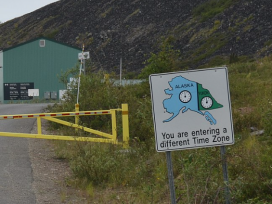
Clock times and social times conflict across much of Europe. Timekeeping is a deeply political matter, and João Lipinsky Nunes of Better Times takes issue with them.
Mbabane, Swaziland: Thembie Manana is a nurse who gives home-based care to people in the scattered villages around Mkhayeni, in the north of the tiny southern African state of Swaziland. Since early last year, she has divided this work with running a kindergarten for about 20 children near her home.
The children are all orphans whose parents have died from HIV. The children are officially called “orphans and vulnerable children”. The kindergarten is an eighteen square metre brick room, hastily built to give the children somewhere to go in the day, to play together and to start learning to read.
In the evenings they run wild in their parentless homes, occasionally watched over by neighbours. “There is nothing here,” says Manana bitterly. She scoffs at the idea of getting help from the municipality.
Thembi’s kindergarten was created by a local organization called Swaziland Positive Living (SWAPOL). It was set up by a group of women nine years ago and now provides care and support to people living with HIV-AIDS and orphans in forty five Swazi communities.
The children and their neighbours live in simple wattle and daub huts. There is no electricity and no running water. After the rains, people collect water from a small stream that they share with livestock. When the stream is dry, which it is most of the year, they have to walk eight kilometres to fetch water from a dam.
It’s an African setting most people in Finland and other rich areas are accustomed to. But Swaziland is different.
SWAPOL operates on the fringes of legality. Surrealistically, it has been branded a terrorist organization by the government. The government offers only piecemeal treatment for HIV at rudimentary health clinics. This is all sponsored by erratic foreign aid.
Swaziland is ruled by an absolute monarch, King Mswati III. He has 13 wives. Each wife lives in her own palace with a massive retinue of servants. The palaces are dotted around the country. When the king or one of his wives goes anywhere from home, roadblocks are set up and the royals are escorted by long fleets of police and army vehicles.
SWAPOL made the grave error of holding a protest when the king spent 50 million USD last year for his wives to go shopping in Europe and the US. The national newspaper Times of Swaziland attacked SWAPOL for “disrespecting the king”.
Swaziland is classified as a middle-income country by the UN. Certainly, there is a lot of conspicuous consumption by the royals and the puppet ministers of Swaziland’s pretend government.
The capital, Mbabane, sparkles with shopping malls and chain stores. Its wealthy suburbs stretch up the foothills of the surrounding mountains. There are guesthouses and lodges everywhere for all the tourists from Europe and elsewhere who come to marvel at the country’s feudal customs and abundant wildlife.
But venture further from town and you find villages and townships of poverty and degradation. Seventy per cent of the 1.2 million-population live below the poverty line. Life expectancy is on average 33 years. The HIV rate is now the world’s highest: nearly thirty per cent of adults, forty nine per cent of young women between the ages of twenty five and twenty nine, and forty three per cent of pregnant women, are HIV-positive.
Poverty and disease are rapidly making the country completely dysfunctional, a wasteland. Over the next few decades, the population will shrink by thirty three per cent. That is a conservative estimate of the US-based Population Reference Bureau.
Public life is centralised around the monarchy. All the ministers and officials are appointed by the king or by his tribal chiefs. All businesses are twenty per cent owned by the king or have to pay heavy taxes to the royal family. All political parties are outlawed.
They include the People’s United Democratic Movement (PUDEMO), whose leader Mario Masuku spent a year in detention, emerging late last year to lead the movement underground. Many of PUDEMO’s members are in exile in neighbouring South Africa. Swazi agents murdered its deputy leader, Dr Gabriel Mkhumane, in South Africa in 2007.
“We have to operate underground because if we were all forced into exile, the ruling elite would have scored a victory,” says Masuku during an early morning interview at a deserted restaurant in Mbabane. “Our message has to be voiced from here: that we want a multi-party democracy, free elections and the start of a country-wide dialogue on how to achieve those things.”
Recent years have seen a heavy crackdown on PUDEMO’s members. Many have died in police detention over the years. Spontaneous street protests are rapidly quashed and demonstrators beaten.
PUDEMO has a multifaceted programme that aims to stimulate international boycotts of the Mswati regime, sustain a mass movement under ground and conduct sabotage operations against the state. The latter have had little impact so far. The most daring, to bomb a bridge and roadway to the main royal residence last year, went badly wrong, killing or wounding the operatives.
Swaziland is called a feudal remnant by some critics of the regime in South Africa. “It’s the wrong picture,” says Masuku. “Swaziland has most of the elements of any modern capitalist state plus its feudalism, which is rooted in the monarchy.”
Since 2005, the country has had a new constitution, which the king uses as a stage prop.
“It is to fool the EU and other governments who want to see the trappings of democracy before they invest or give aid,” says Zodwa Dlamini, a PUDEMO member in exile in South Africa. “In reality, there is no rule of law. It’s all totally random. Swaziland is run by a royal mafia.”
“This is a very small country and there are no strategic interests or resources that interest rich countries in Europe and North America,” says Bheki Makhubu, editor of The Nation, the country’s only independent news magazine. “Things are far worse than in Zimbabwe, but look at all the noise internationally about the situation there.”
The Nation is sometimes fiercely critical of the government, taunting the establishment on one of its covers for being a “Mickey Mouse democracy”, while on the other hand pledging love and devotion to King Mswati in its editorials. It’s a survival tactic that seems to have paid off. The Nation has been banned, briefly, only once.
Masuku and other PUDEMO activists don’t think it amounts to much. The king will tolerate a little criticism when it is targeted at incompetent ministers or chiefs. “He likes watching them fight each other. It makes him look mature and reasonable,” says Zodwa Dlamini.
Each afternoon, Thembie Manana locks up the one-room kindergarten in Mkhayeni and the children go off in different direction to their empty homes. She watches them go. Then she lifts the handles of a large heavy wheelbarrow containing two twenty five-litre water containers and sets off to the local stream.
Published 11 March 2010
Original in English
First published by Ny Tid 4 (2010)
Contributed by Ny Tid © Maren Lübbke-Tidow / Ny Tid Eurozine
PDF/PRINTSubscribe to know what’s worth thinking about.

Clock times and social times conflict across much of Europe. Timekeeping is a deeply political matter, and João Lipinsky Nunes of Better Times takes issue with them.

The Active Amputee blog’s Björn Eser believes that the way we go about prosthetics should change. He’s a lover of the outdoors, even more so since his amputation, but he takes issue with the limits of social and medical support for disabled people.